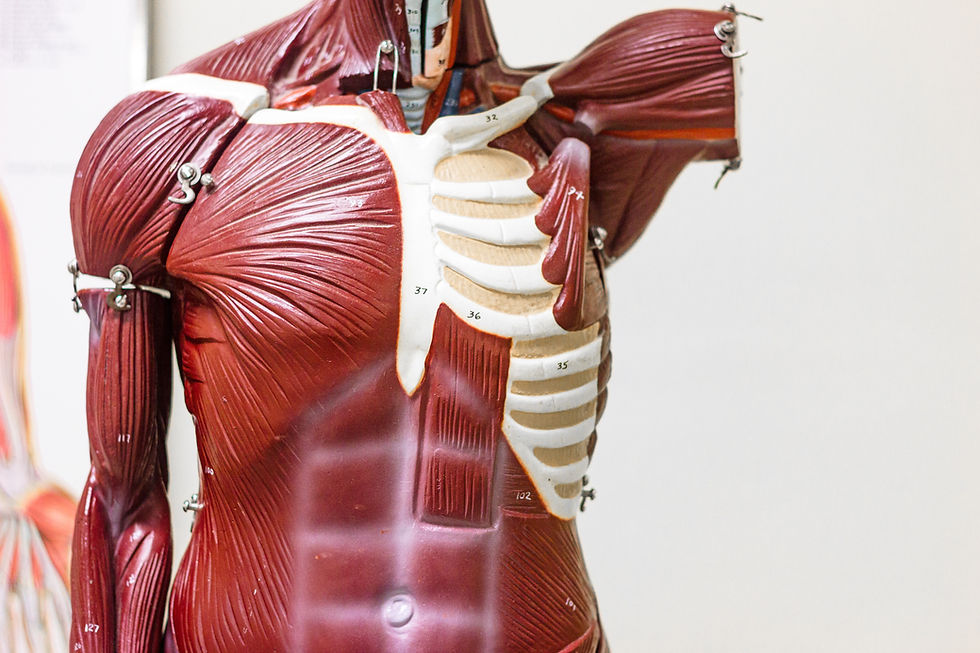The Mighty Macronutrient: Understanding the Power of Protein in Fitness
- elevatedhealthandf
- Sep 5, 2023
- 3 min read
Protein: it’s one of the three macronutrients that we often hear about, alongside carbohydrates and fats. Whether you’re a gym-goer, an athlete, or simply someone who’s conscious about their health, you’ve probably come across numerous articles and discussions emphasizing the importance of protein in a diet. Why all the fuss? In this blog post, we'll delve into the significance of this macronutrient and how it aids in achieving fitness goals.

First, we need to understand the question: what is protein?! Proteins are complex molecules made up of smaller units called amino acids. Our bodies require 20 different amino acids to function properly. While our bodies can produce some of these amino acids (known as non-essential amino acids), others must be sourced from the foods we eat (essential amino acids). From a food source, most people consider meat as the best source of protein. It is certainly the easiest source. Keep in mind that plant sources can also be rich in protein. From a consumption standpoint, it's also important to understand the difference between a lean source and a fatty source of protein. Chicken vs. salmon, for example. Both play a role in fitness, recovery, and overall health and knowing when to use either in a nutrition plan is important for all of the above!

One of the most touted benefits of protein is its role in muscle synthesis. When we exercise, especially during resistance training or weightlifting, we create tiny tears in our muscle fibers. Protein facilitates the repair and rebuilding of these fibers, which ultimately leads to muscle growth. A consistent supply of protein ensures that the body has the necessary building blocks for muscle repair. This is why protein intake is so important when you're doing any type of resistance training. Not only is protein essential for muscle building, but it’s also crucial for the general repair of tissues in our body. Whether you're a long-distance runner, a yogi, or someone who enjoys casual walks, consuming an adequate amount of protein helps with recovery, ensuring that you're ready for your next physical exertion.
Protein has also been proven to help with weightless. Several studies have shown that protein can help in weight management. It promotes satiety, which means you feel full for longer. This can lead to reduced calorie intake throughout the day. Furthermore, the thermic effect of food (the energy required to digest and process nutrients) is higher for protein than for fats or carbs, meaning your body burns more calories processing proteins. On the flip side, as we age, muscle loss (or sarcopenia) becomes a concern. Adequate protein intake, combined with resistance training, can combat the natural decline of muscle mass, allowing individuals to remain stronger and more functional as they age. Did you know that proteins also play a pivotal role in producing hormones that regulate various bodily functions? For instance, some of the hormones responsible for muscle growth and repair are constructed from amino acids derived from protein. Even from a point of immunity, proteins are important...Antibodies, which are crucial in fighting off infections and diseases, are proteins. Hence, a sufficient intake of protein is vital for a robust immune system.

The amount of protein one needs can vary based on several factors, including age, gender, physical activity level, and fitness goals. While the recommended daily intake for an average adult is about 0.8 grams of protein per pound of body weight, those looking to build muscle or engage in high-intensity workouts may need more. For someone involved in a regular resistance training routine should focus on consuming a minimum of 1 gram of protein per pound of body weight. That may sound like a lot, but if one meal averages about 30 grams of protein, you would need to consume 5 meals to achieve a 150g protein intake for the day.
While carbohydrates provide the energy we need for our workouts and fats ensure optimal hormone production and cellular function, protein stands out for its multifaceted role in ensuring that our bodies remain strong, functional, and ready for challenges. Whether you’re striving for muscle gains, weight loss, or simply maintaining a healthy lifestyle, understanding and respecting the role of protein is key to achieving your fitness aspirations. Always remember, though, that balance is essential. Ensure you're also getting adequate amounts of the other macronutrients and micronutrients for a well-rounded and effective fitness journey.



Comments